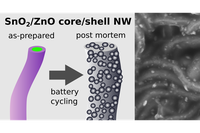Future anode material for lithium-ion batteries?
A collaboration of scientists from the Department of Microsystems Engineering (IMTEK) at the Laboratory for Nanotechnology of Prof. Margit Zacharias, and the Institute for Inorganic and Analytical Chemistry (IAAC) at the University of Freiburg with the Massachusetts Institute of Technology (MIT) has microstructurally investigated the changes of active anode heterostructures for lithium-ion batteries using SnO2/ZnO core/shell nanowires before and after charge/discharge cycling. The results were recently published in ACS Applied Materials & Interfaces. The electron microscopy measurements were performed during the research stay of Jasmin-Clara Bürger in the group of Prof. Frances M. Ross at MIT. The research stay at MIT was funded by a scholarship in the framework of the scholarship program for doctoral students by the German-American Fulbright Commission (Fulbright Doktorandenprogramm).
For further improvement of the storage capacity, in particular, heterostructured and nanostructured anodes are discussed in the literature. Especially SnO2 and ZnO are considered to be promising anode materials in future lithium-ion batteries due to their high storage capacity compared to the commercial graphite electrode. However, little is known about the microstructural changes of the selected SnO2/ZnO core/shell nanowires due to the electrochemical cycling. Nevertheless, this is essential for understanding the mechanisms and for the subsequent success of the heterostructured electrode. The high-resolution electron microscopy-based studies selected by the authors allow for precise investigation of the structural and compositional changes before and after electrochemical cycling. In the context of the recently published research article, enhanced particle formation for the SnO2/ZnO core/shell nanowires compared to uncoated SnO2 nanowires after cycling was observed and discussed, considering the possible chemical reactions in this material system.
The research article:
Jasmin-Clara Bürger, Serin Lee, Jan Büttner, Sebastian Gutsch, Maximilian Kolhep, Anna Fischer, Frances M. Ross, and Margit Zacharias. High-Resolution Nanoanalytical Insights into Particle Formation in SnO2/ZnO Core/Shell Nanowire Lithium-Ion Battery Anodes. ACS Appl. Mater. Interfaces 2023, 15, 23, 28387–28397. https://doi.org/10.1021/acsami.3c03025
Contact:
Jasmin-Clara Bürger
University of Freiburg
Department of Microsystems Engineering - IMTEK
Laboratory for Nanotechnology
Georges-Köhler-Allee 103
79110 Freiburg
E-mail: jasmin-clara.buerger@imtek.uni-freiburg.de
Prof. Dr. Margit Zacharias
University of Freiburg
Department of Microsystems Engineering - IMTEK
Laboratory for Nanotechnology
Georges-Köhler-Allee 103
79110 Freiburg
E-mail: margit.zacharias@imtek.uni-freiburg.de
Prof. Dr. Anna Fischer
University of Freiburg
Institute for Inorganic and Analytical Chemistry
Albertstrasse 21
79104 Freiburg
E-Mail: anna.fischer@ac.uni-freiburg.de
Kerstin Steiger-Merx
Representative PR/Marketing
Faculty of Engineering
University of Freiburg
Tel.: 0761/203-8056
E-Mail: steiger-merx@tf.uni-freiburg.de

